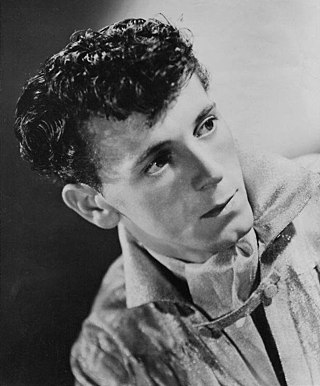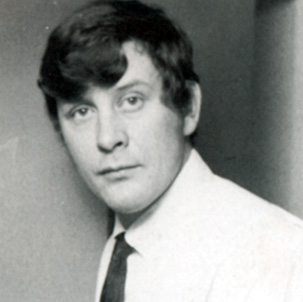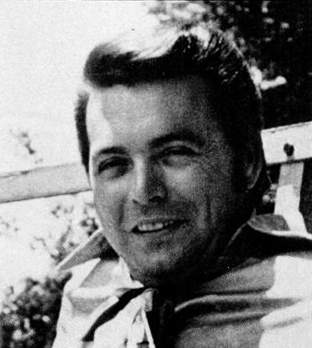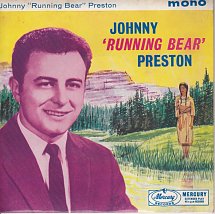
Vincent Eugene Craddock, known as Gene Vincent, was an American rock and roll musician who pioneered the style of rockabilly. His 1956 top ten hit with his backing band the Blue Caps, "Be-Bop-a-Lula", is considered a significant early example of rockabilly. His chart career was brief, especially in his home country of the US, where he notched three top 40 hits in 1956 and 1957, and never charted in the top 100 again. In the UK, he was a somewhat bigger star, racking up eight top 40 hits from 1956 to 1961.

Michael Peter Hayes, known as Mickie Most, was an English record producer behind scores of hit singles for acts such as the Animals, Herman's Hermits, the Nashville Teens, Donovan, Lulu, Suzi Quatro, Hot Chocolate, Arrows, Racey and the Jeff Beck Group, often issued on his own RAK Records label.

Mickey Leroy Gilley was an American country music singer and musician. Although he started out singing straight-up country and western material in the 1970s, he moved towards a more pop-friendly sound in the 1980s, bringing him further success on not just the country charts, but the pop charts as well.

Crazy Legs is a studio album by Jeff Beck and the Big Town Playboys, released on 29 June 1993. The recording is an album of Gene Vincent songs. The album is considered to be a tribute to Gene Vincent and His Blue Caps, and in particular to Vincent's early guitarist Cliff Gallup, who Beck recognized as his biggest influence.

"You Don't Know Me" is a song written by Eddy Arnold and Cindy Walker in 1955. "You Don't Know Me" was first recorded by Arnold that year and released as a single on April 21, 1956, on RCA Victor. The best-selling version of the song is by Ray Charles, who took it to number 2 on the Billboard Hot 100 chart in 1962, after releasing the song on his number 1 album Modern Sounds in Country and Western Music. The first version of the song to make the Billboard charts was by Jerry Vale in 1956, peaking at number 14 on the pop chart. Arnold's version charted two months later, released as an RCA Victor single, 47–6502, backed with "The Rockin' Mockin' Bird", which reached number 10 on the Billboard country chart. Cash Box magazine, which combined all best-selling versions at one position, included a version by Carmen McRae that never appeared in the Billboard Top 100 Sides listing.
The Big Town Playboys are a six-piece acoustic British rhythm and blues revival group. Founded by Ricky Cool and Andy Silvester in 1984, and known as Ricky Cool and the Big Town Playboys, they covered American music from the 1940s and 1950s, such as that of Amos Milburn and Little Walter.
Clifton E. Gallup was an American guitarist. He was the lead guitarist for the rockabilly group Gene Vincent and the Blue Caps throughout the 1950s.

"Running Bear" is a teenage tragedy song written by Jiles Perry Richardson and sung most famously by Johnny Preston in 1959. The 1959 recording featured background vocals by George Jones and the session's producer Bill Hall, who provided the "Indian chanting" of "uga-uga" during the three verses, as well as the "Indian war cries" at the start and end of the record. It was No. 1 for three weeks in January 1960 on the Billboard Hot 100 in the United States and the same on Canada's CHUM Charts. The song also reached No. 1 in the UK Singles Chart and New Zealand in 1960. Coincidentally, "Running Bear" was immediately preceded in the Hot 100 No. 1 position by Marty Robbins' "El Paso", and immediately followed by Mark Dinning's "Teen Angel", both of which feature a death of, or affecting, the protagonist. Billboard ranked "Running Bear" as the No. 4 song of 1960. The tenor saxophone was played by Link Davis.

"Crazy Crazy Nights" is a song by American rock band Kiss. It was originally released on the band's 1987 album Crazy Nights. Although it peaked at only number 65 on the US Billboard Hot 100, the song became the band's highest-charting single in the United Kingdom, peaking at number four on the UK Singles Chart. In August 2019, it received a Silver certification from the British Phonographic Industry for sales and streams exceeding 200,000. The song also reached the top 10 in Ireland and Norway.

Chain Lightning is an album by American singer-songwriter Don McLean. It was recorded in Nashville between June and August 1978 and featured many of that city's noted session players as well as backing vocals from the Jordanaires. It was first released in December 1978 in the UK and other markets, but not released for another two years in the US following its delayed success in European markets. The lead single "Crying" became a major hit for McLean, reaching No.1 in the UK Singles Chart in June 1980. The album was subsequently repackaged and released in the US where it also became a success with "Crying" reaching the top five in early 1981. "Since I Don't Have You" was also released as a single, reaching #23.
"Crazy Arms" is an American country song which was a career-making hit for Ray Price. The song, released in May 1956, went on to become a number 1 country hit that year, establishing Price's sound, and redefining honky-tonk music. It was Price's first No. 1 hit.
"The Monkey Time" is a song written by Curtis Mayfield and performed by Major Lance. It reached No. 2 on the U.S. R&B chart, No. 8 on the U.S. pop chart, and No. 32 in Canada in 1963. It was featured on his 1963 album The Monkey Time, was arranged by Johnny Pate and produced by Carl Davis.
"Honky Tonk Memories" is a song written by Rory Bourke, Gene Dobbins and Johnny Wilson, and recorded by American country music artist Mickey Gilley. It was released in June 1977 as the second single from his album First Class. The song reached number 4 on the Billboard Hot Country Singles chart and number 2 on the RPM Country Tracks chart in Canada.
"Chains of Love" is a song written by Ahmet Nugetre and Harry VanWalls, and recorded by American country music artist Mickey Gilley. It was released in October 1977 as the third and final single from his album First Class. The song reached number 9 on the U.S. Billboard Hot Country Singles chart and number 7 on the Canadian RPM Country Tracks chart.
"You've Got Something on Your Mind" is a song recorded by American country music artist Mickey Gilley. It was released in August 1985 as the lead single from his album I Feel Good About Lovin' You. The song reached number 10 on the U.S. Billboard Hot Country Singles chart and number 7 on the Canadian RPM Country Tracks chart in Canada. It was written by Norro Wilson, Dave Gibson, and Roger Murrah.
"Your Memory Ain't What It Used to Be" is a song recorded by American country music artist Mickey Gilley. It was released in December 1985 as the second and final single from his album I Feel Good About Lovin' You. The song reached number 5 on the U.S. Billboard Hot Country Singles chart and number 2 on the Canadian RPM Country Tracks chart in Canada. It was written by Mary Fielder, Kim Morrison and Dickey Betts.
"Doo-Wah Days" is a song written by Edward Hunnicutt, Doug Gilmore and Gary Vincent, and recorded by American country music artist Mickey Gilley. It was released in July 1986 as the only single from his album One and Only. The song reached number 6 on the U.S. Billboard Hot Country Singles chart and number 9 on the Canadian RPM Country Tracks chart in Canada.

"I'm Your Puppet" is a song written by Dan Penn and Spooner Oldham; the best known version is the one recorded by James & Bobby Purify which reached #5 on the US R&B chart and #6 on the Billboard Hot 100 in 1966. The single was nominated for a Grammy Award for Best R&B Performance by a Duo or Group with Vocals in 1967. The song was featured on their 1967 album, James & Bobby Purify.
"Shirley" is a song originally released by John Fred and the Playboys in December 1958 by Montel Records. It was the band's debut single and reached number 82 on the Billboard Hot 100 in March 1959. The song became an international hit in 1982 when it was covered by Shakin' Stevens, peaking at number 6 on the UK Singles Chart.
Tom Takayoshi was a record label founder as well as a president of a major United States record label. His involvement in the music industry goes back to the early 1960s.








